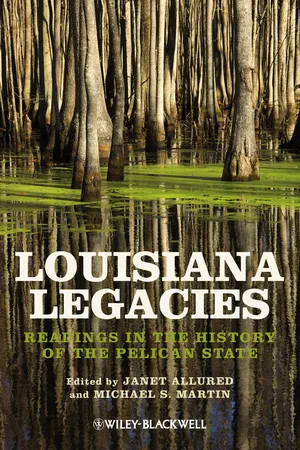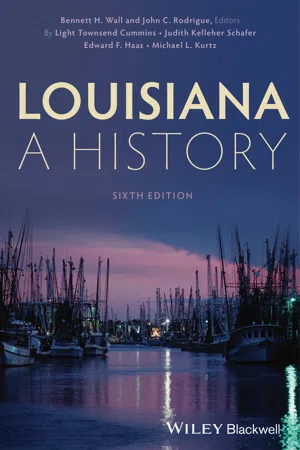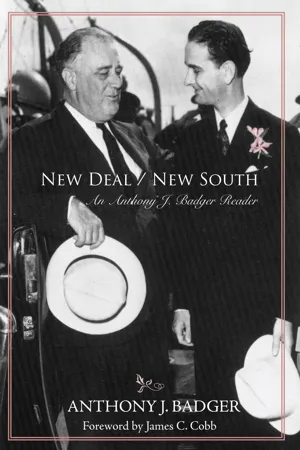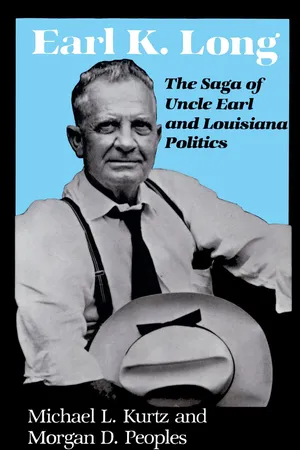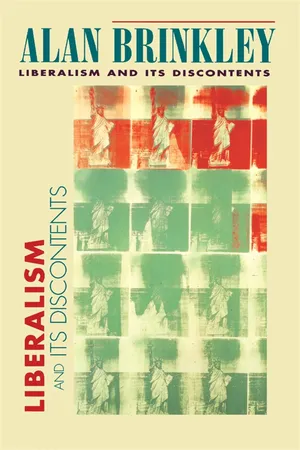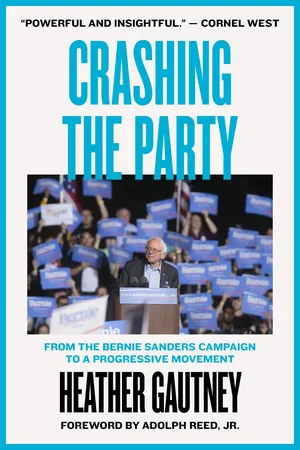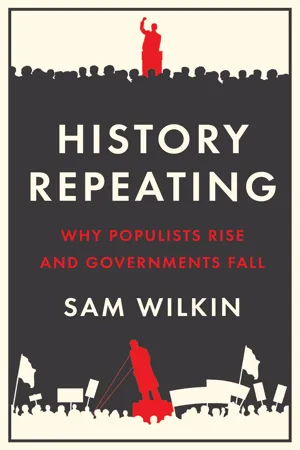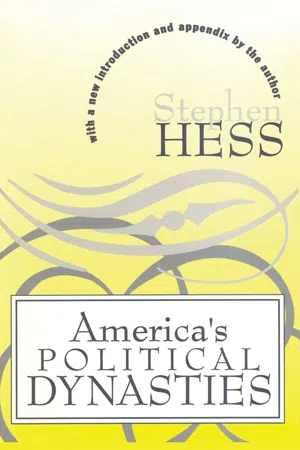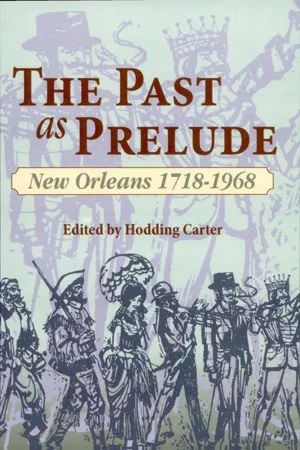History
Huey Long
Huey Long, also known as "The Kingfish," was a charismatic and controversial American politician who served as the governor of Louisiana and later as a U.S. senator. He was known for his populist policies and fiery rhetoric, advocating for wealth redistribution and social reforms during the Great Depression. Long's political career was cut short when he was assassinated in 1935.
Written by Perlego with AI-assistance
Related key terms
1 of 5
10 Key excerpts on "Huey Long"
- eBook - ePub
A Legacy of Leadership
Governors and American History
- Clayton McClure Brooks(Author)
- 2013(Publication Date)
- University of Pennsylvania Press(Publisher)
Chapter TwoHuey Long and the Great Depression
Rise of a Populist Demagogue
RICHARD D. WHITE , JR .From 1928 until his violent death in 1935, Huey Long did more good for the people of Louisiana than any politician before or since. In the midst of the Great Depression, he built nine thousand miles of new roads, erected more than a hundred bridges over swamps and rivers, and pulled his state from the horse-and-buggy days into the age of modern transportation. By giving free textbooks to students he allowed thousands of poor children to attend school, and his adult night classes taught 175,000 illiterate Louisianans to read, including many poor blacks. He doubled the number of beds in the state’s charity hospitals. He raised the state university to national stature in size and scholarship. He lessened the burden on poor farmers by giving a homestead property tax exemption and allowed thousands of them to vote when he abolished the poll tax. To legions of ill-housed, ill-fed, and ill-clothed Louisianans, Long incarnated the savior of the common man and the liberator of the downtrodden.1 The country people “worshiped the ground he walked on,” a newspaperman observed. “He was part of their religion.”2Paradoxically, Huey Long also did more harm to the state of Louisiana than any politician before or since. As governor and later U.S. senator, he seized near-absolute control and by the end of his tempestuous reign dominated almost every aspect of government. He conquered the state legislature and ordered it to slavishly pass hundreds of bills that increased his power, destroyed his enemies, and stretched the very limits of constitutionalism. He packed the courts with his loyalists to ensure that his increasing power went unchecked. He used political whim to hire thousands of state government workers, from cabinet secretaries to laborers shoveling gravel onto highways, while thousands of local school-teachers, sheriff deputies, and courthouse clerks fell under his political boot. His lust for power led him to ruthlessly destroy his enemies’ political careers, ruin their businesses, raise their taxes, and fire their relatives from government jobs.3 He orchestrated elections, padded voting lists, and directed the counting of ballots. He assaulted freedom of the press by proposing a gag law that prohibited newspapers from criticizing him. He deployed the state militia as his personal police force and declared martial law in cities that refused to submit to his mastery. He packed the membership of government boards, courts, and parish councils with his own majority, gerrymandered political divisions to remove enemies from office, stripped opposing public officials of their power to hire and fire people and to make and spend money, and, without warning, revised the dates for elections and length of time in office to oust his enemies and open the door for his loyalists. When his cronies broke the law, he pardoned them.4 - eBook - ePub
Louisiana Legacies
Readings in the History of the Pelican State
- Janet Allured, Michael S. Martin(Authors)
- 2012(Publication Date)
- Wiley-Blackwell(Publisher)
In his day, Long fostered both bitter opposition and unquestioning support. His opponents tended to view him as not simply corrupt but as a threat to self-government and democracy in the state and the nation. His supporters tended to view him as a savior, a politician who for the first time in Louisiana’s history cared about and protected the common folk from the “interests”—big business, bankers, and entrenched politicians. Historians, as they have assessed Long and his place in Louisiana’s history, have interpreted him in much the same ways.The dispute among historians over Huey Long revolves around a number of questions about him and his influence. What motivated Huey to do the things he did, a thirst for power or genuine concern for the commoners of Louisiana? Did the positive ends he created outweigh the corrupt means he used to achieve them? What was his long-term influence on Louisiana’s politics, and was it beneficial? Varying interpretations of Huey Long are evident in the essays by Jerry Sanson and Glen Jeansonne. Sanson contends that although Long had deep flaws, one of the overwhelmingly positive benefits he brought about, and one of his long-term influences in Louisiana politics, was his ability to convince the people of the state that government could work for their benefit. Jeansonne, conversely, portrays a Huey Long much more sinister in his goals and his effects. He craved power first and foremost, and any benefits he may have provided for the people of Louisiana were simply a means of reaching that goal. Even then, the benefits were strictly limited. Jeansonne contends Long’s Share Our Wealth proposal was little more than a sham and argues that Long expanded corruption on such a grand scale that it became a matter of course in state politics.Anthony Badger assesses Long’s lingering effects in his essay on race and corruption in twentieth-century Louisiana politics. The picture Badger paints is bleak. Louisiana’s voters came to expect the benefits provided by Huey Long and his successors such as Earl Long, John McKeithen, and Edwin Edwards, as a basic service of the government, and many of them were willing to turn a blind eye to corruption in exchange. Voters concerned with ending corruption also expected those benefits, albeit with a more honest and efficient government in power, but they typically had to give their votes to “reform” candidates who championed segregation and disfranchisement. The legacy of the corruption and racism in Louisiana’s politics was still being felt at the time Badger wrote his essay (2000), and it goes a long way toward explaining the state’s budgetary, educational, and political crises at the turn of the twenty-first century. - eBook - PDF
Louisiana
A History
- Bennett H. Wall, John C. Rodrigue, Bennett H. Wall, John C. Rodrigue(Authors)
- 2013(Publication Date)
- Wiley-Blackwell(Publisher)
At the time of Long’s murder in 1935, Share Our Wealth had become nationally organized, with, according to its proponents, as many as 3 million members. Many even considered Long himself to be a viable rival to Roosevelt for the presidency. The widespread appeal of Share Our Wealth con- vinced the president that the New Deal should move closer to Long’s program. Consequently, the so-called Second New Deal (1935–38) included social secu- rity, federal support of organized labor, and a national minimum wage, none of which had received Roosevelt’s endorsement before Long’s emergence on the national scene. Huey Long was undoubtedly the most famous Louisianan who ever lived. Certainly his impact on millions of lives was far-reaching; the ultimate results of Roosevelt’s “move to the left” to “steal Long’s thunder,” as one scholar described the policy shift, were such later programs as Harry Truman’s Fair Deal, John Kennedy’s New Frontier, and Lyndon Johnson’s Great Society. One of the great if unrecognized truths of American history was that these compre- hensive reform efforts developed at least partly from the ideas and actions of a neopopulist radical from rural north Louisiana. The place and time of one’s upbringing, and especially the beliefs and values present in one’s childhood, are crucial in determining the course of a person’s life. Huey Long was born on August 30, 1893, in what one biographer has described as “the strange and stark region . . . called Winn Parish.” Most specu- late that had Long arrived thirty years earlier or later, on some plantation, in New Orleans, or even in some other state entirely, he probably would still have made a name for himself (very likely in politics), but given his intellect and adaptability his program and style would almost certainly have been different. - eBook - ePub
New Deal / New South
An Anthony J. Badger Reader
- Anthony J. Badger(Author)
- 2007(Publication Date)
- University of Arkansas Press(Publisher)
1 Huey Long and the New Deal Politicians who combined demagogic appeals to lower-income white farmers, bitter denunciations of large corporations and Wall Street, and vitriolic personal abuse of their opponents were a familiar sight in the twentieth-century South. In a one-party system where the key election was the Democratic Party primary, candidates had to mobilize voters without the benefit of a party organization. Large-scale campaign finance from conservative economic interests offered one means of getting out the vote. Support from county elites who manipulated local power offered another. To a candidate who could rely on neither campaign wealth nor the endorsement of local power brokers, the only alternative path to power was a colorful and dramatic personal campaign to arouse the electorate. 1 Among these southern demagogues, Huey Long of Louisiana was sui generis in three respects. First, most southern demagogues, once elected, either quickly shelved their reform rhetoric, substituted appeals to racial prejudice for substantive reform, or found themselves stymied by conservative legislatures. Long largely eschewed racial appeals and translated his electoral promises to the poor whites of Louisiana into real legislative achievement in the fields of highways, health, and education between his election as governor in 1928 and his assassination in 1935. Second, few southern demagogues showed any appetite for the hard work of long-term political organization. But Long, once he had survived an impeachment attempt in 1929, built himself an almost impregnable power base in Louisiana, maintaining ruthless control of the state legislature not only while he was governor, but also while he was a United States senator. Third, most southern demagogues did not travel well: their appeal was parochial, regional at best - eBook - ePub
Earl K. Long
The Saga of Uncle Earl and Louisiana Politics
- Michael L. Kurtz, Morgan D. Peoples(Authors)
- 1991(Publication Date)
- LSU Press(Publisher)
5Thus, by the time Huey Long came to power in Louisiana, his predecessors had set the stage for his programs. Long, then, can be considered not as a revolutionary but as a popular leader who advocated and implemented policies started by others. Huey Long, however, was not merely another in a scries of reformers. With a charismatic personality and a driving ambition, he became Louisiana’s “messiah of the rednecks,” leading the poor masses to political and economic salvation. He could sec clearly what his opponents only dimly perceived, that in the common people, there existed a political force of unusual potency, and he would harness it to his advantage. Capturing the hearts of the poor, Long became their champion by voicing their grievances and frustrations and promising to do something about them. He awakened the tenant farmer and the sharecropper and the common laborer from their traditional apathy and brought them to the polls in record numbers. Attacking the big corporations and the vested interests, he engendered a mass movement among the people, thus linking his power firmly to the bedrock of overwhelming popular support. Once in office, Long realized that to retain that support, he would have to live up to his campaign promises, and within a few years, the state abounded with physical monuments to his success: thousands of miles of new roads, many of them paved; bridges spanning broad rivers; a vastly expanded state university; a magnificent new state capitol. At last, state government seemed to care for the ordinary man and woman. That Long’s programs did not substantially improve their standard of living hardly mattered to the people. What did matter was that in Huey Long, they had a deliverer. By a sudden transformation, Louisiana politics became based on popular support, and this had a magical effect on public opinion. By the time of his death, Long was revered and idolized as was no other figure in the state’s history. To this day, many Louisianians give him credit for things he did not do—for example, state-funded old-age pensions and the new Charity Hospital in New Orleans.6 - eBook - PDF
- Alan Brinkley(Author)
- 2000(Publication Date)
- Harvard University Press(Publisher)
It may also be reasonable to suppose that a historian writing in the 1950s and 1960s about a popular leader attacking a reac-tionary southern oligarchy was inºuenced in some way by the civil rights movement, an assumption that Williams’s rather-too-forgiving picture of Long’s record on race relations would seem to support. But this is speculation. In the end, the best clues we have to what Williams intended are within the book itself. Williams’s biography remains the fullest and most exhaustively re-searched study of Huey Long. No one will ever again have access to the many associates and acquaintances of Long whom Williams inter-viewed; and since Long left no personal papers of any consequence, it is clear that in that sense at least this is a project that can never be repli-cated or entirely replaced. But what really distinguishes Williams’s Huey Long from the numerous other biographies that have appeared both before and since 1969 is its evaluation of Long himself. Williams was a frank, unashamed revisionist who set out to rehabilitate Long’s historical reputation. The Huey Long he portrayed was not without ºaws, certainly. Williams conceded that he “came to grasp for too much power, to look on power as something to be gained for the sheer pleas-ure of its use.” 23 But Williams’s Long was an authentically populist-progressive politician, who shattered an archaic political structure and replaced it with one that, at last, delivered real services to the people who needed them most. Long created an infrastructure in Louisiana that allowed it to emerge from its status as an underdeveloped region and begin to join the modern world. He turned the gaze of white Louisianans away from the “romantic” politics that had enchanted them for generations (the politics of race and white supremacy and the Lost Cause, a politics, Williams argues, that was irrelevant to their real needs). - eBook - ePub
Crashing the Party
From the Bernie Sanders Campaign to a Progressive Movement
- Heather Gautney(Author)
- 2018(Publication Date)
- Verso(Publisher)
1Crashing the Party
“Every man a King,” he recalled, cutting into one of the meatballs on his plate. “That was his big slogan. That, and ‘Share the Wealth.’ ” It was the same spaghetti and meatballs he’d ordered the last time we met for dinner, and the time before that. “He built hundreds of bridges and roadways throughout the state …”I had just returned from New Orleans and was recounting a conversation I’d had with a cab driver down there about former Louisiana governor Edwin Edwards. Bernie’s segue to Huey Long was almost immediate: “Long ran on redistributing wealth and helping the poor. He was probably the most famous populist in American history”—he moved his arms up and down, much like Long—“known for his firebrand speeches, yuge crowds …”As his fork rejoined the heap of pasta before him, the senator rattled off a series of reforms: Social Security, universal health care, free textbooks and higher education, minimum wage increases and a basic income guarantee, public works, capping wealth and taxing it—all of which sounded like his own platform. He didn’t romanticize The Kingfish—his hideous racism, abuses of power, flamboyance that would make even Donald Trump blush. But Long’s championing of the powerless against corporate giants like JP Morgan and Standard Oil clearly resonated with him. It resonated with me, too.One of the first things I’d read about Bernie while preparing to work in his office was that he carried Eugene Debs’s keychain in his pocket. I felt a kind of kinship with him, because I too possessed a similar prized relic: an original Socialist Party charter certificate with Debs’s name handwritten in quivering block letters. Huey Long was a hot mess. But Debs was the antithesis of the adage that a great man cannot be a good man. A fierce crusader against worker exploitation and imperialist war, he despised capitalism, “a monstrous system,” as he called it, and fought the power on the heels of the Gilded Age, building worker organizations and the party itself. The same year that John D. Rockefeller became America’s first billionaire, Debs ran for a fourth time as the Socialist Party’s presidential candidate, capturing 6 percent of the vote, as some 1,200 other Socialists won seats in local and state government. - eBook - ePub
History Repeating
Why Populists Rise and Governments Fall
- Sam Wilkin(Author)
- 2018(Publication Date)
- Profile Books(Publisher)
In the Senate, Huey Long quickly ran into trouble. He was, it must be said, not much of a team player. He was born to rule or die trying. He immediately provoked an irreparable break in relations with the leader of his own Democratic Party and ended up resigning all his committee appointments in a fit of pique. Possibly, his policies could have appealed to the average Joe in an increasingly unequal society. But his ideas were extreme. He introduced a bill that sought to limit family fortunes to $100m. It went nowhere. Long issued dire warnings. ‘It is no campaign to soak the rich,’ Long said. ‘It is a campaign to save the rich. It is a campaign the success of which they wish for when it is too late.’Soon, Huey Long was heading for confrontation with President Franklin D. Roosevelt – despite some points of agreement on Progressive issues and their Democratic Party kinship. The clash of cultures was intense. Roosevelt invited Long to his family’s estate for dinner. At one point during the awkward conversation, Roosevelt’s mother asked – within Long’s earshot – ‘who is that awful man?’ During the presidential election, Long had offered to campaign on Roosevelt’s behalf. Roosevelt’s campaign chief turned him down, noting privately that Huey Long was ‘somewhat of a freak’ – an assessment that, frankly, is hard to dispute. Eventually, Long decided to campaign unofficially on Roosevelt’s behalf in the Dakotas, Iowa, Kansas and Minnesota. He drew huge crowds. A Democratic state chairman sent Roosevelt a message: ‘if you have any doubtful state, send Huey Long to it’. Later, Roosevelt’s campaign manager admitted that ‘we underrated Long’s ability to grip the masses’. He continued: ‘We never again underrated him.’During the first year Roosevelt was in office, Long opposed about half of the administration’s bills. Partly for good reason: Roosevelt initially appeared to have no interest in sharing the wealth. In fact, as the US economy continued to flounder, Roosevelt drastically cut the budget, imposing austerity in a downturn. ‘[He’s] a phony,’ Long eventually said of Roosevelt. ‘He’s living on inherited income.’ By the spring of 1933, Long had broken openly with the president, and opposed just about everything his administration did – even progressive measures. - eBook - ePub
- Stephen Hess(Author)
- 2017(Publication Date)
- Routledge(Publisher)
* Yet there are others who paint a less promising picture of the senator’s future. They see his present position of national leadership in the Democratic Party as basically inconsistent with the views of the party and people in Louisiana, especially on civil rights issues. And those who walk a tightrope must be aware of the risks of a fall.The Longs of Louisiana: Huey, Earl, George, Rose, Blanche, Russell, Gillis, and Speedy—two governors; a lieutenant governor; three United States senators, elected five times; three congressmen, elected five times. All in two generations!Huey, of course, was the colossus; without him there could have been no dynasty. Some dynasts are the driving force within the family, instilling the desire for office and the sense of public service in their heirs, but leaving little mark on their times; some become dynasts because of the marks they have left. Their flamboyant personalities or records of achievement create a demand for those who bear their name. Huey Long was of the latter variety. There is no record that he set out to create a dynasty; the dynasty was created because there was Huey. His name became a passport to public office in Louisiana.This is not to say that there is no pride of family in the Longs. However, it was not the force that initially propelled the dynasty. And as often as not family pride was blunted by competing ambitions. Like a child’s kaleidoscope whose loose fragments form an endless variety of patterns, political relationships within the dynasty have been in a constant process of change, of grouping and regrouping, as Longs fought one another, united, and fought again.Yet through it all there has been a steadfastness to the populist legacy of Huey. The differences have not been ideological. Beneath the comic antics and political cynicism of Huey and Earl, there was a genuine desire to better the poor and disinherited. It was the root of their strength. And by and large it has been passed on to the second generation. - eBook - ePub
The Past as Prelude
New Orleans 1718–1968
- Hodding Carter(Author)
- 2009(Publication Date)
- Pelican Publishing(Publisher)
Thus did the Kingfish enter upon his tyrannical seven-year dictatorship over Louisiana. He was preparing to run for the presidency of the United States against Roosevelt in 1936 when, on September 8, 1935, an assassin's bullet ended his reign and his life.It has been truly said that the era of Huey Long was like a nettle rash, irritating and at times painful, but never tedious. Within a year he was impeached by the House of Representatives. Long had offended many legislators. He had boasted publicly to a New Orleans gathering that "I hold all 52 cards at Baton Rouge, and I shuffle and deal them as I please." He told a group of officials from West Feliciana parish about their member in the House of Representatives that: "I bought him like you'd buy a sack of potatoes to be delivered at your back door."He proposed to levy a special processing tax against the Standard Oil Company in an era when at least 18,000 of Baton Rouge's then 25,000 inhabitants were directly supported by a breadwinner on the Standard's refinery payroll. Standard countered by detouring a shipment of machinery for a proposed eight million dollar Baton Rouge plant expansion from the docks at New Orleans to Bayonne, and threatened to withdraw from the state. All legislators who harbored resentment against the selfproclaimed Kingfish allied themselves with a move to impeach him.However, the ouster was aborted by having one charge tried and dismissed, and voiding all the others with a round robin which fifteen Senators signed to the effect that because of a technicality, they would refuse to convict the Governor on any of the remaining charges, regardless of evidence. Since fifteen signers constituted two more than one third of the elected Senate membership of thirty-nine, and a two-thirds vote was required for conviction, the stymied anti-Long contingent adjourned the session and went home.In an atmosphere of gathering storm, New Orleans approached the 1930 election for its city-parish officials. Both major candidates for Mayor were anti-Long: one was Francis Williams, who, with his brother Augustus, had been city manager for Long's first gubernatorial campaign in 1924, but had quarreled with him and was now among the bitterest of his enemies.
Index pages curate the most relevant extracts from our library of academic textbooks. They’ve been created using an in-house natural language model (NLM), each adding context and meaning to key research topics.

